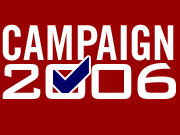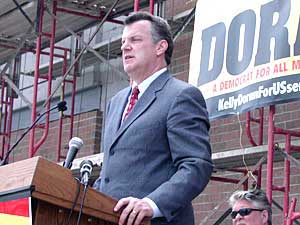Photos
| ||||||||||||||||||||||
St. Paul, Minn. — (AP) In the seven months since developer Kelly Doran jumped into Minnesota politics, the DFL gubernatorial candidate has hit all of his party's key themes.
Now, as party activists learn of past donations to Republicans, he's found himself defending his Democratic credentials. Doran is one of four major candidates seeking the DFL nomination to take on Republican Gov. Tim Pawlenty in 2006.
The campaign donation issue boiled over this week when Doran sent a letter to DFL Party Chairman Brian Melendez to respond to letters circulating among party delegates over his political giving.
Over the past five years, Doran contributed nearly $1,000 to Republican causes, including a $250 check he cut last December to the House Republican caucus. He also donated $1,000 to Independence Party gubernatorial candidate Tim Penny in 2002.
Doran and his wife, Maria, have upped their contributions to Democrats this year, spreading almost $30,000 among federal and state candidates and caucuses.
"I'm not a party activist. I never claimed I was," Doran said in an interview Friday. "I don't think that should be the rule for deciding who the candidate should be."
Doran said he gave to state House Republicans while attending a fundraiser as a member of the Minnesota Shopping Center Association. In the letter to Melendez, Doran said "that contribution does not mean I support the House Republican agenda in any way."
He added later, "Being a Democrat should not mean you are required to have blind obedience to every Democrat elected official's point of view."
Doran remains a largely unknown quantity in state politics. After making millions as a real-estate developer, he decided this spring to run for U.S. Senate but shifted to the governor's race in September. Doran has shown a willingness to dig deep in his own pocket to fund his bid.
He plans to run in next year's DFL primary regardless of whether he has the party endorsement, which will be decided at the June convention. Besides Doran, the DFL candidates are Attorney General Mike Hatch and state Sens. Steve Kelley and Becky Lourey.
Even if the cross-party contributions hurt Doran's standing with hardcore Democrats, it could help him with the centrist voting bloc he is courting. Dan Hofrenning, chairman of St. Olaf College's political science department, said it bolsters his moderate image.
The fact the donations were brought to light speaks volumes, Hofrenning said.
"It's clear Kelly Doran has established himself as a credible candidate," he said. "Clearly people are worried about him."
It's not the first time a candidate has had to address a donation track record.
In 2004, Democratic congressional candidate Teresa Daly acknowledged giving $50 in 2002 to her Republican opponent, U.S. Rep. John Kline.
In 2000, U.S. Senate hopeful Mike Ciresi was accused of being too stingy when it came to donating to Democratic candidates and party committees.
Paul Omodt, Ciresi's spokesman in that campaign, said the donation question was something that mattered more to delegates than general voters. Ciresi failed to get the DFL endorsement and finished second in a party primary.
"Delegates tend to want to find some kind of purity. Is this candidate going to pass the sniff test?" Omodt said. "The mass electorate cares more about the message of campaign. Your ability to get things done."





